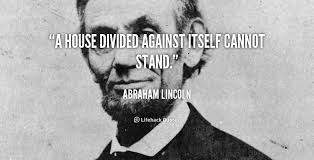Lincoln warns that America is becoming a “house divided”

On June 16, 1858, newly nominated senatorial candidate Abraham Lincoln addresses the Illinois Republican Convention in Springfield and warns that the nation faces a crisis that could destroy the Union. Speaking to more than 1,000 delegates in an ominous tone, Lincoln paraphrased a passage from the New Testament: “a house divided against itself cannot stand.”
The issue dividing the nation was slavery’s place in the growing western territories and the extent of federal power over individual states’ rights. Lincoln declared that only the federal government had the power to end slavery. While the southern states relied on an economy and lifestyle dependent upon the cheap labor provided by African-American slaves, the North opposed slavery on moral grounds. The northern states also considered industrialization and manufacturing the key to America’s economic future, not farming. The entrance of new states into the Union, such as Missouri, Kansas and Nebraska, brought to a head unresolved conflicts over which government entity—state or federal—should make the final decision regarding slavery. For his part, Lincoln firmly believed that slavery was immoral and was wholly incompatible with the principles of the Declaration of Independence embodied in the phrase “all men are created equal.” However, Lincoln prioritized preserving the Union above all else.
After Lincoln’s speech, several of his friends expressed dismay at its “radical” content. Leonard Swett, a lawyer and friend of Lincoln’s, later wrote that Lincoln’s talk of using federal power to end slavery was “unfortunate and inappropriate,” although Swett admitted that in retrospect Lincoln was ultimately correct. At the time, the people of Illinois ultimately agreed with Swett: Lincoln lost the close Senate race of 1858 to the more moderate Stephen Douglas, who advocated states’ sovereignty. Lincoln’s eloquent speech, though, earned him national attention and his strong showing in the polls encouraged the people to back his ultimately successful bid for the presidency in 1860.
Link: https://www.history.com/this-day-in-history/lincoln-warns-that-america-is-becoming-a-house-divided
Picture Link: please click here




